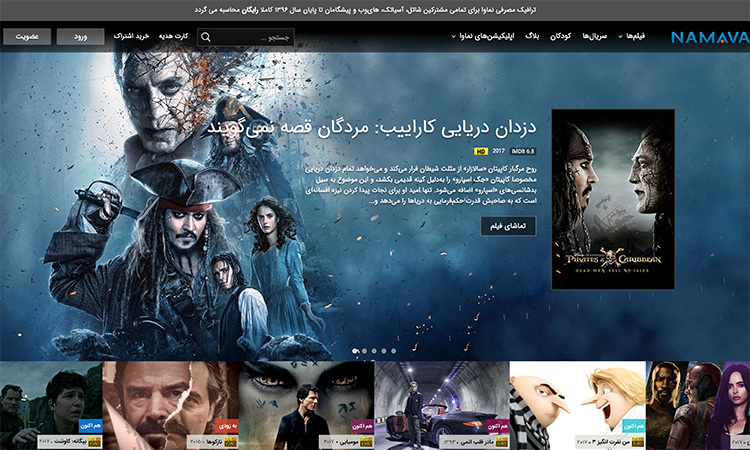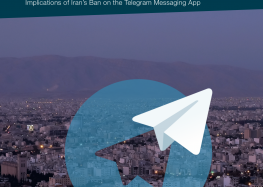Tehran Prosecutor: Streaming TinyMoviez Website Shut Down For “Indecent” Content

Case Highlights State Sanctioning of Copyright Infringement in Iran
The popular Iranian streaming movies website, TinyMoviez, which featured pirated material, was shut down for distributing “indecent” foreign films, announced Tehran Prosecutor Abbas Jafari Dowlatabadi on October 10, 2017.
The prosecutor was responding to media reports that the TinyMoviez website was shut down by a judicial order in response to complaints from the owners of a rival website seeking to take down its competition.
“The primary suspect is a 25-year-old man living in Neishabour [northeastern Iran], whose monthly revenues were more than 100 million tomans (approximately $30,155 USD),” said Dowlatabadi.
“He admitted renting servers in several Western countries, including Canada, which allowed subscribers to download more than 18,000 Farsi-voiceover Hollywood movies with indecent and immoral content.”
The Iranian government censors and blocks the distribution of content deemed “immoral” by the state, including any digital or print content featuring women without the Islamic hijab, and content challenging state cultural and political narratives.
Six administrators of the TinyMoviez website were arrested in September 2017 following complaints from their business rivals, which were licensed to distribute the pirated material by the Iranian government, according to an investigation by the Center for Human Rights in Iran (CHRI).
Copyright in Iran
Although Iran is not a signatory to the Universal Copyright Convention, the government requires domestic distributors of foreign productions, including films and games, to apply for licenses from the Ministry of Culture and Islamic Guidance.
Iranian copyright laws cover digital and non-digital productions.
Non-digital content, including books and paintings, is covered by the Law for the Protection of the Rights of Authors, Writers, and Artists, which only mentions foreign productions in Article 22 in prohibiting the distribution of any original cultural material, domestic or foreign, without a government license.
Digital content is regulated by Iran’s Digital Publications Law, which doesn’t specify distribution rights for foreign-produced content.
Given the dearth of legal provisions and regulations, how do Iranian agencies control foreign content inside the country?
“Movies in Iran are usually distributed by individuals or companies with exclusive licenses issued by government organizations such as the Culture and Islamic Guidance Ministry,” a Tehran-based film producer who asked not to be identified told CHRI on October 11, 2017.
“There are Iranian websites such as Filimo that operate similar to Netflix,” added the producer. “These sites do not have licenses from the original producers. They also censor the content themselves to make sure it complies with Iranian laws. But if there’s a problem, they will get a phone call or an email from the guidance ministry and they’ll have to correct it or remove the film within 24 hours.”
He added: “Licenses [to distribute the content] are issued in two ways. One is, first come first serve. The other is granted through an auction to the highest bidders. You do not need a license from the original [foreign] producers at any stage [to distribute the content in Iran].”
CHRI has learned that the so-called “auctions” are not conducted in a public setting. Instead, those interested in distributing foreign films in Iran must make bids to the guidance ministry, which then grants licenses to the bidders with the best offers and conditions. Once a license is issued, other distributors are not allowed to distribute the licensed content.
The lack of transparency and anti-competitive state policies have resulted in a system that gives precedence to distributors who can develop a close relationship with the licensing authorities. Iran’s licensing requirements also amount to a state monopoly over the products independent of and with no consideration for the original copyright holders.
“With the cooperation of government agencies, we are taking action against [Iranian] sites of unknown origin,” said Mostafa Abtahi, the head of the Visual Media Institute, which operates under the Ministry of Culture and Islamic Guidance, on August 2, 2016.
“We are studying license requests from three sites that have been offering movie downloads without permission,” he added.
Iran’s online movie distribution business is extremely competitive because it offers high profit margins since distributors are not required to pay hefty licensing fees to the original copyright holders. With relatively little capital and an affordable license from the Ministry of Culture and Islamic Guidance, anyone can build a website and charge subscriptions to watch thousands of pirated films.
TinyMoviez, which was unlicensed, charged 4,000 tomans per month, or about $10 USD before it was shut down. Licensed websites charge much more, for example, the Namava Iranian streaming movies website charges three times more than TinyMoviez.
Licensed Iranian movie sites only stream non-Iranian films to audiences inside Iran. Those with foreign IP addresses are blocked from accessing them to avoid international copyright infringement violations.
Licensed sites are also granted preferential status by state agencies and on Iran’s domestic internet, the National Information Network, which offers discounted fees to attract subscribers to the state-sanctioned websites.






